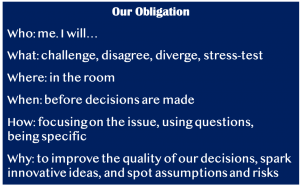If you’re trying to foster a culture of productive conflict in your team, be careful that your language doesn’t let them off the hook. Getting your team members to stick a toe in the water of dissention, challenge, and disagreement is a big ask. If your language makes it seem optional, it’s not likely that people will give it a try. Today, I want to give you the framework for a conversation you can have with your team that will help shift their mindset from productive conflict being optional to it being non-negotiable.
Before we dive in, I have to tell you the funny story of how I came to this insight. It’s actually a story from home, rather than work. Many years ago, our younger daughter wanted to try out for cross-country running. Her dad is a great runner who can bang out marathons with little difficulty, so we were all for it. She signed up and enthusiastically ran laps of the track before school a couple of days a week. When the track meet eventually arrived, she came 283 out of 290 runners. Sadly, her athletic genes came from me, not her dad. (But that’s not the interesting part of the story…)
Flash forward to the next fall when I find the permission form for cross-country in her backpack. I sign it and holler enthusiastically, “Your form is in your bag!” The next weekend, I’m doing my weekly hazardous waste check of the backpack, and what do I find at the bottom of the bag—a soggy, crumpled permission form. And that’s my a-ha moment. Giving someone permission to do something they don’t want to do doesn’t work.
Giving someone permission to do something they don’t want to do doesn’t work.
Unfortunately, that’s what we do when it comes to productive conflict. We give people permission to give us feedback, to challenge our ideas, to instigate a debate, but they tuck that permission away because they aren’t interested in doing those things. As far as they’re concerned, conflict is optional, and they choose not to exercise that option.
We need an alternative to giving permission. If you want to create a culture of productive conflict on your team, you need to set up an obligation. Each person needs to understand the consequence to the team if they don’t step up and challenge.
Exercise
I encourage you to have a discussion with your team about the obligation to disagree. Feel free to use my cross-country story! Here are some conversation guides you can use.
What do we need to disagree about?
- How could our team benefit if we disagreed more with one another?
Example: we could come up with more creative ideas
Example: we could spot assumptions that people are making that might not be true - What are some examples of constructive tensions we could add to our discussions?
Example: We could question the facts
Example: We could view the issue from a different stakeholder’s perspective - What happens if you think something contrary but don’t say it?
Example: You get more and more frustrated
Example: You don’t give the team a chance to benefit from the idea - How is the business affected if we stifle conflicting opinions?
Example: We stay misaligned and run into problems in implementation
Example: We make risky decisions - What does it mean to be the devil’s advocate? How can that role be helpful? How does it go awry?
Example: It’s helpful if you challenge the assumptions - Example: It’s not helpful if the same person is always the one disagreeing
How do we need to disagree?
- When is the right time to disagree with a decision? When is the wrong time?
Example: We need to disagree as early as possible in the decision-making process
Example: Once the decision is made, we wait until an agreed upon time before evaluating whether it was the right decision - How can we raise different perspectives so that it feels constructive?
Example: We can use questions as a way to more constructively raise other perspectives
Example: We can say what we agree with first and then share what we disagree with second - What behavior would derail our attempts at productive conflict?
Example: If we yell or use accusatory language
Example: If we discuss our concerns outside the meeting or only with certain team members
At the end of this discussion, I encourage you to summarize your commitments into a short set of guidelines your team will follow when it comes to productive conflict. You can use this format or create your own.

Further Reading
9 Easy Ways to Improve Decision Making on Your Team
Culture is the Cheapest Thing to Change
The #1 Crisis Facing Organizations: The Need for More Conflict

The timing of this topic could not be more appropriate for me and my team! thank you, I will be trying this with my team very soon
Heather, it’s so great when my timing is good. Please let me know how it goes and shoot me a note if you have any questions! Good luck!